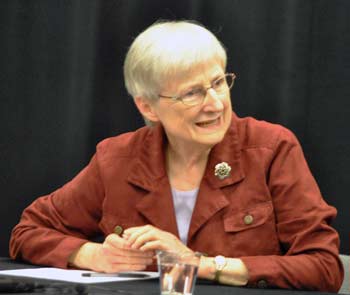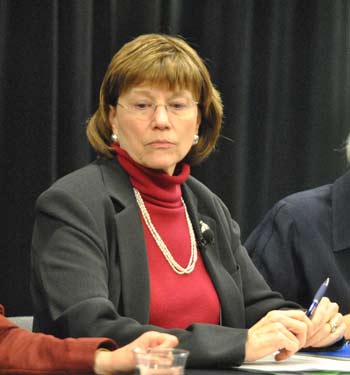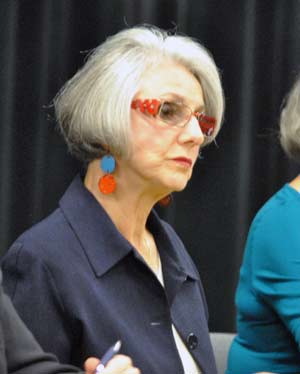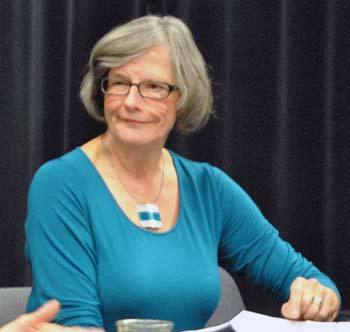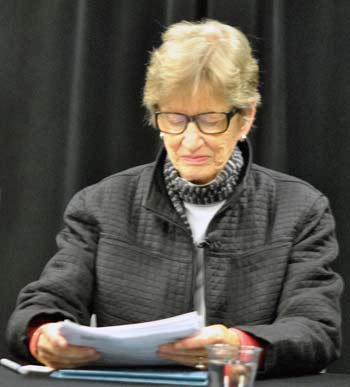Library Board Candidates Compete for 4 Seats
The four incumbents running for seats on the Ann Arbor District Library board are unified in their support of a new downtown library and the $65 million, 30-year bond proposal to fund it, which will be on the Nov. 6 ballot. In sharp contrast, the fifth candidate – Lyn Powrie Davidge, calling herself a “renegade” – isn’t in favor of that particular proposal at this time.
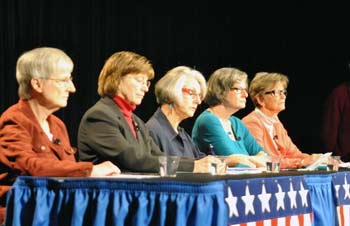
Candidates for the Ann Arbor District Library board, from left: Lyn Davidge, Rebecca Head, Nancy Kaplan, Margaret Leary, Prue Rosenthal. (Photos by the writer.)
The five women presented their views at an Oct. 9 forum moderated by the League of Women Voters of the Ann Arbor Area. They are vying for four non-partisan seats on the AADL board, with four-year terms. The incumbents are Rebecca Head, Nancy Kaplan, Margaret Leary and Prue Rosenthal. [Other board members, whose terms end in 2014, are Barbara Murphy, Jan Barney Newman and Ed Surovell.]
All candidates expressed strong support and affection for the library system, and stressed the library’s critical role in the community. Two candidates – Davidge and Leary, the board’s current president – are former librarians. Head, Rosenthal and Kaplan highlighted their professional and volunteer experience. Several candidates cited their work on boards for other organizations.
Positions on the bond proposal for a new downtown library revealed the greatest difference between the incumbents and Davidge. All of the incumbents argued strongly in favor of the proposal, citing deficiencies in the existing building at 343 S. Fifth and a desire to accommodate growth in programs and services.
Saying she wasn’t running against anyone, Davidge felt she’d bring a fresh perspective to the board and challenge the status quo. She believes the case hasn’t been fully made for a new library at the time, and that the public hasn’t been as engaged as it should be in the decision.
For more background on the downtown library proposal, see Chronicle coverage: “Library Bond Moves Toward Nov. 6 Ballot,” “Campaign Launches for Library Bond,” and “Third Group Forms to Oppose Library Bond.” The Chronicle also covers the board’s monthly meetings.
The Oct. 9 candidate forum was held at the studios of Community Television Network, and will be available online via CTN’s video-on-demand service. Information on this and other local elections can be found on the Washtenaw County clerk’s elections division website. To see a sample ballot for your precinct, visit the Secretary of State’s website.
Opening Statements
Each candidate was given one minute to make an opening statement.
Prue Rosenthal: She said she’s delighted to be running for the board. She listed her experience over the last four years as treasurer and vice president of the board, and chair of the board’s facilities committee. She loves the job, and hopes to be able to continue doing it. The library is an incredibly important part of the city, she said, serving the whole community. It provides extensive services to children, parents, grandparents, people from different countries. Books are available in eight different languages. You can get CDs and movies, attend lectures, learn a language or how to operate a computer – all of these things happen at the library, she said. The board takes pride in running a fiscally sound organization that’s attentive to the needs of the community, Rosenthal said, and is careful with revenue from the community.
Margaret Leary: She described the library as about the most important civic, cultural and educational institution in the city. It’s fiscally responsible, yet always growing. It’s a separate legal entity with its own taxing authority, she explained. It’s not part of the city, the county, the public schools or the Downtown Development Authority. The AADL has a permanent millage, but currently levies less than the full authorized amount, which saves taxpayers $1.6 million a year, she said. [The library levies 1.55 mills, but is authorized to levy up to 1.92 mills.] The library has built three new branches in the last decade – on time and on budget, she noted. The library serves all ages, all economic groups, and is the one public place where everyone can come for free to learn, whether with a book, electronically or in a group. Last year, AADL held 2,000 computer classes, had 80,000 attendees of programs, a quarter-million Internet sessions, 1.6 million visits and 9 million circulation transactions. Leary concluded by asking voters for a third term on the board.
Nancy Kaplan: Her reasons for running are the same as when she first ran two years ago, Kaplan said. The library is an essential community resource. Her goal is to contribute to its innovative growth and development, while being fiscally prudent. She’s committed to representing patrons of all ages, socio-economic levels and capabilities. The library is at an important juncture, she said. With an excellent record of fiscal responsibility, the library now wants to invest in its future. “The decision is yours, and the opportunity is yours,” she said. Whatever the next steps, Kaplan said she welcomes the public’s input. She was honored by the voters’ confidence and trust in her two years ago, and has been pleased with the exchange of ideas since then. She’d like to continue to represent residents, and asked people to vote for her.
Rebecca Head: The AADL is an outstanding library system, she said, and she’s honored to serve and to run for re-election. Serving on the board has allowed her to hear from the community, from all the residents, and to work to meet their needs. AADL provides services, programs and tools for every community resident in a manner that “exemplifies its democratic nature – it is open to all.” Head said she’s committed to provide to community members the constant, careful support for all issues facing AADL and the community. She hoped people would vote for her.
Lyn Davidge: She described herself as the “renegade” of the group – the only non-incumbent running for the board. She emphasized that she’s not running against anyone. “I am running for our fabulous library, and its users and constituents.” She believes she has something to offer by bringing to the board some questions and perspectives that might challenge the status quo, but also fuel some new ideas. She’s eager to give back to her hometown and to what’s been her public library for most of her life. She’d be honored to serve on the board and participate in the critical decisions at this important time.
Experience
What professional experiences led to your run for the library board, and what was the most significant in preparing you for this office?
Davidge: She said she’s a librarian by profession, retired from the University of Michigan library. She also worked for 12 years as a substitute librarian for AADL, and has had some experience in school media centers. Right out of college, she also had four years of teaching experience. All of that experience makes her very familiar with both the library and education worlds, Davidge said. She’ll draw on those experiences to help shape the future of AADL and she’s excited by the prospect of doing that.
Head: She has served on local, state and national boards, and has also served as staff for various boards – so she sees both sides. She understands that a board works on policy and helps set the direction for an organization, as opposed to doing the work of staff. Her professional experience as a manager and a board member in other arenas helps her be a good library board member, she said.
Kaplan: As former director of a department of physical therapy, Kaplan said that gave her experience dealing with a budget. She also had to interact with people at UM and St. Joe’s, so she learned how to work with people and to reach compromises for a result. Besides that professional experience, Kaplan cited her volunteer work for Washtenaw Literacy and Jewish Family Services as giving her insight into what other people might need, and how the policy of the library might be helpful to them.
Leary: She is trained as a librarian, with a master’s degree in librarianship and a law degree. Her professional work has been as a librarian – for about 25 years she was director of the University of Michigan law library, which had a $7 million budget and 40 full-time-equivalent employees. Leary also cited her experience on boards of other organizations, and agreed with Head’s statement about a board being a policy-making body and not necessarily dealing with day-to-day work. She has served as president of the 5,000-member Association of American Law Librarians, which gave her experience as a board member for a large organization.
Rosenthal: In addition to serving on many boards, Rosenthal said she’s been a user of libraries, which has led her to understand their significance. She said she’s been a board member of museums, schools and the AADL, and has also served as chair. She understands the role involved in leadership as well as compromise and working with staff members, the director and chief financial officer of the library. It’s important to understand where another person is coming from, she said, as well as to work on policy, and to influence how the library moves ahead.
Downtown Library
Do you support the $65 million bond proposal to build a new downtown library?
Head: She supports the proposal because the current library building as it’s configured and constructed doesn’t really meet the needs of the current residents, and she doesn’t believe it will meet the needs of the future. It’s a poorly constructed building, she said, adding that the library staff does a wonderful job of keeping it in good shape. It has had in the past year 600,000 visits, she noted, and those keep growing. But it has a lot of problems. She cited the thick cement floors that prevent the library from expanding its technology infrastructure. If they continue in the current building, she said, “it’ll be a band-aid effect.” And from an ecological and environmental point of view, the building needs to become energy efficient and water efficient, she said – a building of the future.
Kaplan: The board vote to put the bond proposal on the ballot was a unanimous one, Kaplan said, and she supports it. The library needs to move into the future, and the current building won’t accommodate future needs. One of the major issues is compliance with the ADA [Americans with Disabilities Act], she said. The ADA took effect after the building was constructed, she said, and right now there’s only one bathroom that’s compliant. The whole building should be compliant, she said, whether you’re a mother with a carriage or an elderly person with a walker – “the building should feel comfortable and accessible to all.” Also, the building’s sight lines should be set up to make everyone feel safe, Kaplan said. The building should be lighter and brighter, she added, as well as being able to accommodate technology infrastructure.
Leary: She described herself as a very enthusiastic supporter of the bond proposal. The current building is really three buildings, she noted, “and all three of them are worn out.” They weren’t put together correctly, she said, so they can’t be made much more efficient. There will soon be the need for expensive repairs. The board has studied this issue for a long time, she said. They engaged in a very thorough review four years ago, and again reviewed that information this spring, she said. A complete renovation of the building up to current standards would cost 90% of what it would cost to have a completely new building that’s even bigger than the current one, she said. Now is the time to do it, Leary added, when there are low interest rates and low construction costs. The project would provide jobs for the community. The demand for use of the downtown building exceeds the supply of space. “It’s time for a new building,” she concluded.
Rosenthal: The library has outgrown the downtown building, she said. The town has grown, and library usage has grown 12% in the last 10 years. They need to double the available space. It’s not ADA compliant. The building needs more bathrooms, more spaces for people who are not capable of going up and down stairs easily, more elevators. Meeting rooms are used beyond capacity. “We turn people away constantly.” They need an auditorium where everyone can see and hear presentations, that includes facilities for the handicapped. Half the people who come to events have to watch on a TV in another room, she said. She said patrons need better access to the Washtenaw Library for the Blind and Physically Disabled, which AADL manages. Researchers need access to the Ann Arbor News archives. A quiet room is needed for uninterrupted study and reading.
Davidge: “Well, I said I was the renegade,” Davidge began, “and I am not in favor of this particular proposal at this particular time.” That’s not to say that she’d never be in favor of a new library, she added. But right now, the case hasn’t been fully made. The community doesn’t feel particularly well-engaged with the process. She’s concerned that there hasn’t been any preliminary plan. She understands the need not to spend a lot of money before funding is approved, but there is no real specific plan for a new building. There are a lot of unanswered questions. She said she’s looked at the statistics for the meeting space – known as AADL Freespace – and it appears to be very much underutilized. She’d like the board to take a step back and look at a few of these things before moving forward. The public should also be involved in a better way.
Library Branches
In your view, what’s the reciprocal relationship between the downtown library and the AADL branches?
Kaplan: The downtown library is the main branch for a reason, she said. About a third of the system’s visits are to the downtown location – of the total 1.7 million annual visits to all branches, about 600,000 of those are to the building at 343. S. Fifth. The majority of AADL’s resources are downtown. In contrast, neighborhood libraries are just that, she said. They are meant for the neighborhoods. If you want to do major research, you’d probably come downtown. The downtown building is also on the bus line, she noted. People come downtown for many reasons, and one of those reasons is to use the library.
Leary: The downtown library is the “mothership” of AADL’s system, Leary said. It’s the place where most of the librarians are, where most of the collection is. It has the largest meeting rooms and is the place that can provide the most to the person who comes there. The branches are intended to be conveniences, she noted, and to bring the library as close as possible to neighborhoods. The locations of the branches have been carefully planned to be spread around the city so that they serve residents equally. With technology, the library system can take good advantage of the branches, she said. For example, you can request a book online and pick it up at any of the branches or downtown. The spending on the branches is proportional, she said. AADL has done a great job of building three new branches. Leary noted that eventually it’s hoped a new west branch will be built as well.
Rosenthal: The downtown location is the central library, where most of the collection is, where most of the staff is, where they hope to house the Ann Arbor News archives. and where the Library for the Blind and Physically Disabled is currently located. It’s a center where people come and meet – most of the evening programming is located there, and people can use the bus to get there. It’s the most convenient place, she said. Rosenthal noted that the library is very fiscally responsible. The three new branches were built using the fund balance. They hope to provide the same kinds of services that are now at the branches to the downtown library “in a major way.”
Davidge: She joked that by this point – after others had addressed the question – there isn’t a lot to add. She agreed that the downtown location is the flagship. It’s the original library, and at one point was the only library. People get very possessive of their neighborhood branches, she noted – because they love them. The branches are a great convenience and a great way for the library to reach out into the community in new ways. As the board and staff plan for the downtown library – whatever it might be – it’s important to keep the fund balance in mind, and to do what they can within the current budget, she concluded.
Head: As the mother of a 17-year-old daughter, Head said her family loves all the branches. But they really enjoy going to the downtown location – because after they’re finished there, they can go someplace else downtown. It’s very convenient. There are about 500 events just at the downtown library each year. It says a lot that people come to those events and clamor for more, she said. Having an efficient, larger downtown library will serve the city well, Head added. Having that anchor for the citizens as well as for a vibrant downtown is really critical.
What If the Bond Proposal Fails?
What’s your Plan B if voters don’t approve funding for a new downtown library?
Leary: It’s critical for the bond proposal to pass, Leary began. But if it doesn’t pass, the board will have to decide what to do next. That will depend on the conditions, she said. It’s one situation if the proposal fails by just a little bit, and another situation if it fails by a large margin. If the bond proposal fails and the board doesn’t try to put it on the ballot again at a later date, the library will spend more of its operating budget on maintaining the inadequate building, she said. “We will spend good taxpayer dollars after bad taxpayer dollars.” They’ll need to replace an elevator for $1 million. They’ll have to replace a roof, and repair damage done from internal leaks. They’ll need to replace parts of a heating/ventilating/air conditioning system. “The building is worn out, and it wasn’t that good to start with,” she said. “We really need a new one, and that will be my focus, even if the bond fails – to figure out what to do next.”
Rosenthal: The library has a fund balance, she said, and board members are very proud of that because it allowed them not to charge the community the full millage rate for the last four years – when people were having a tough time because of the economy. The library levies 1.55 mills instead of 1.92 mills. That fund balance will get very quickly swallowed up if they have to take a building that’s three buildings in one and cobble it together with the community’s best interest in mind, she said. They’d have to spend money on the kinds of things that Leary had mentioned – a new elevator, new roof, new wifi and computers – instead of providing programs and other opportunities for the community. “Our community deserves wonderful, fabulous library and does not deserve a patched-together, efficient but not prime-material building.”
Davidge: If the proposal fails, that’s a signal to the board to take a step back, a deep breath and a closer look at things, she said. It means the community doesn’t have enough information and is not ready to move forward. She said she’d advocate to find creative ways to reach out to the community, to get the maximum amount of community input – perhaps through citizen advisory committees, perhaps through “snail mail” to people who don’t have computers and Internet access – and really involve the public in looking at the situation. That doesn’t mean it should take a lot of time, she said. But the board would need to really find out why the proposal failed and what they should do in the future. That might mean remodeling, Davidge said.
Head: “I’m hopeful that the bond vote will not fail,” Head began. The building has a boiler from 1958 that doesn’t simply need replacement – it needs an entire new HVAC system, she said. The library needs an environmentally sensitive, appropriate, efficient building to save operating costs in the future. For about a dollar a week, she said, or $56 per year, the owner of a $200,000 house can get a new library. “That’s pretty good.” If this fails, the library will use dollars that would otherwise be used for services and programs, she said, and that would be unfortunate. “We have such a sterling library system – I’d hate for it to go downhill.”
Kaplan: She agreed with what the other current board members had said. It would be a shame to take funds from the operating budget to repair and maintain the existing building, and not use the money for programs. AADL has a good track record, Kaplan said. The district library has built three neighborhood branches that are loved and used – within budget, on schedule – and that says something. The library system is an independent unit. It’s not part of any other government unit. The district library is very fiscally responsible, she said, and she hopes that will be considered when people vote. She hopes people feel they can trust the library to use their money well and that taxpayers will be making an investment in the future.
Closing Statements
Each candidate had the opportunity to make a two-minute closing statement.
Kaplan: The role of the library is evolving and growing, she began. “We are books, and so much more.” Story hour remains an essential ingredient in a preschooler’s life. Computers and computer training sessions have grown, reflecting their importance in society, she noted. AADL has successfully taken over the Washtenaw Library for the Blind and Physically Disabled, and the Ann Arbor News archives. Diversity is fundamental to the library’s community outreach. As examples, Kaplan cited the library’s cooperation with the prisoner re-entry program, with the University of Michigan’s English-as-a-Second-Language (ESL) family tutoring program, lectures on a variety of topics, and programs with the Ann Arbor public schools.
Excellence in service is the library’s goal, Kaplan said, which means moving into the 21st century with the newest technology, while keeping the comfort and pleasure of the book in a truly barrier-free environment that welcomes all. She encouraged viewers to attend board meetings and speak during the time for public comment. [The next board meeting is on Monday, Oct. 15 at 7 p.m. in the downtown library's fourth-floor conference room, 343 S. Fifth Ave.] It’s an excellent opportunity for the board to hear what’s on the public’s mind. “This is your library, and we want to hear from you.” She’d like the opportunity to continue on the board, and she asked people for their vote. She concluded by directing viewers to her campaign website for more information.
Head: One of her priorities is for the district library system to remain robust and relevant for the current population, and in the future as well. It’s important to offer AADL’s amazing services, materials and programs, Head said. She’s proud of what the library does, and proud to say she’s on the board and serving everyone in the area. It’s important to have a library. She promised to strengthen the already solid community partnerships. The library is great at collaborating, she said, and she gives a lot of credit for that to the library director, Josie Parker, and to staff.
She said she’s committed to continue providing careful fiscal oversight and to seek input from community members. Now, there are challenges with the downtown building. There are also challenges as print media is being phased out into electronic media, and in figuring out how as a library they can work with that change, she said. AADL is on top of that issue, Head added, and she’s proud to be on a board that supports it. She also encouraged people to come to the board meetings, to tell the board what they think, and to be part of the community.
Leary: If she’s elected to a third term, Leary promised to continue AADL’s two traditions. One is fiscal responsibility, and the other is to continue to expand services and collections. She brings to the board her experience as a librarian and lawyer, her experience directing UM’s law library for 25 years, a decade on the Ann Arbor planning commission, and her work with the Institute of Continuing Legal Education, Habitat for Humanity of Huron Valley, and the United Methodist Community’s Heritage Foundation board. She’s lived in Ann Arbor since 1973, and has been a homeowner since 1976. Libraries are a key component of the educational system, including lifelong learning, literacy and computer access. They are also a key component of democracy, she said.
The downtown library is the mothership, and must be kept strong to keep the entire system strong. “We need a new building downtown,” Leary said. The board has studied this for several years. She noted that there’s a huge amount of information on the AADL website, and on the Our New Downtown Library website. The library held three public forums, she said, and has received comments on the AADL director’s blog. Now is the right time for a new downtown building, with low construction costs, and to avoid the need to put more money into a bad building. Ann Arbor uses the library, Leary said. Compared to five peer libraries in university towns, AADL has more than twice as many circulation transactions – in total and per capita – than the library that’s second to AADL, she said. Among the 12 public libraries in southeast Michigan, AADL is third from last in total revenue per capita. “We might have less money, but we do a lot more.” She asked for people to vote for her, so that she could continue serving them on the library board.
Rosenthal: She moved to Ann Arbor in 1977, “and I’ve used the library since probably the second day I was here.” She had young children at the time, and they’d all go down to the library and get books. The children were delighted to know that although everything else was new and different, the library was essentially the same as it had been in Boston, where they’d previously lived. She hopes to continue leading the AADL into the 21st century. The library wants to expand services, work with the community to find out what they want, and to help the public know what the library can do for them. As libraries expand and change, it will be an evolving, changing experience for everyone in the community. “We’ll all be learning together about the new things that technology can bring to the library.”
She cited her experience working with other boards, and said she enjoyed the collaborative experience of working with staff and AADL leadership. Libraries are the heart of the community. The AADL serves as a national leader, she said, providing valuable services and innovative programs, providing tremendous value to citizens and taxpayers. The current downtown facility is no longer adequate, with structural shortcomings, capacity limitations and foundational inefficiencies. Rebuilding now is a wise investment, Rosenthal said, as interest rates are at an all-time low, and construction costs are very competitive. The AADL leadership has demonstrated strong fiscal stewardship of tax dollars, responsiveness to the community’s needs, and has built several successful satellite branches on time and within budget, she said. Ann Arbor deserves a great library, and now is the time to invest in this critical resource for the community. Rosenthal asked for the public’s vote so that she can continue to work with this community to make that happen.
Davidge: “You may vote yes on the library bond proposal, and vote for me,” Davidge said. “You may vote no on the proposal, and vote for me.” It’s not about where any of them stand on that issue – it’s about what happens next, she said. If elected, she’d take office in January of 2013, and by then the next steps will be underway, she noted, whatever they are. It would be her responsibility to support the decision of the voters. She’d plan to get up to speed and jump into it as quickly as possible. She’d ask questions, offer new perspectives and “certainly give my opinions.” But her goal would be for everyone to move forward in the most effective, responsible way possible. Whether the library is then planning a new downtown building or a renovation of the existing one, she’d advocate for extensive community input. This will be the time for everyone who loves the library to come together, share their views, work diligently to make the downtown branch to come, to learn, to read and to grow.
As virtually a lifelong resident, Davidge said, she knows the Ann Arbor community, and the district library as well. [Her father, Emerson F. Powrie, served as deputy superintendent for the Ann Arbor Public Schools in the 1970s when the library was part of the school system, and the library director reported to him.] As a career librarian, she said she knows the library world. And as a former employee and longtime cardholder at AADL – since 1946 – she has particular knowledge of the library, its climate and its culture. She’s excited at the prospect of being able to come full circle and give back to the library as a board member. She said she’ll approach the job with integrity, enthusiasm and openness to the best of her ability. Davidge concluded by asking viewers for their vote.
The Chronicle would not survive without regular voluntary subscriptions to support our coverage of local government. We hope you elect to subscribe. Click this link for details: Subscribe to The Chronicle. And if you’re already supporting us, please encourage your friends, neighbors and colleagues to help support The Chronicle, too!




